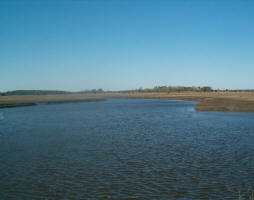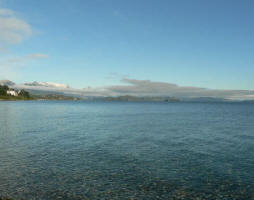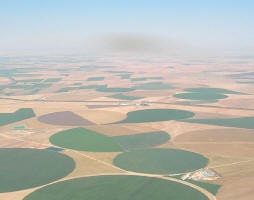 What does Climate Change mean for Arab countries? - Arab Environment Watch
What does Climate Change mean for Arab countries? - Arab Environment Watch
It has been more than 40 days since the USA and China drafted the toothless "Copenhagen Accord" in cooperation with Brazil, India and South Africa during the United Nations Summit on Climate Change in Copenhagen. The accord that has sidelined the EU and most developing countries has failed in identifying specific targets for emission reductions. It has also asked all industrial countries to have a commitment to emission reduction by the end of January 2010. Obviously, this is not going to happen.
The global campaign against climate change needs all the resources it can derive, and the Arab world should not be an exception. Amazingly, the most vivid criticism of global climate policies from the Arab world has came not from governments, NGOs or the private sector but from the spiritual leader of Al Qaeda, the world's most destructive terrorist group. In his latest recording Osama Bin Laden stated that "speaking about climate change is not a matter of intellectual luxury - the phenomenon is an actual fact". He went further to analyze global policies and demand more sustainable use of resources.
Arab environmentalists can be better off without the support of Bin laden but they have to me more vocal and effective in their pursuit for civic engagement and advocacy to pressure lenient public action on climate change. The Arab world will not be spared from the impacts of climate change, in fact it will be one of the most affected regions.
One of the most comprehensive efforts in documenting the current and proposed impacts of climate change on the Arab world was done by the Arab Forum for Environment and Development (AFED). In a landmark report published last November, AFED has provided to the Arab world the best scientifically-researched argument for the urgent need to mitigate and adapt to climate change.
A simulation carried out for AFED by Boston University's Center for Remote Sensing revealed that a sea level rise of only 1 metre would directly impact 41,500 km2 of the Arab coastal lands. The most serious impacts of sea level rise would be in Egypt, Tunisia, Morocco, Algeria, Kuwait, Qatar, Bahrain, and the UAE.
The effects on the region's agricultural sector would mostly be felt in Egypt, where a 1 metre rise would put 12% of the country's agricultural land at risk. It would also directly affect 3.2% of the population in the Arab countries, compared to a global percentage of about 1.28%.
Human health would be adversely affected by higher temperatures, mainly due to changes in geographical ranges of disease vectors like mosquitoes, waterborne pathogens, water quality, air quality and food availability and quality.
Incidence of infectious diseases like malaria and schistosomiasis will increase, mainly in Egypt, Morocco and Sudan. Malaria, which already infects 3 million people annually in the Arab region, will become more prevalent and enter new territories as higher temperatures reduce the incubation period, spread the range of malaria-bearing mosquitoes and increase their abundance. Higher CO2 concentrations and fiercer and more frequent sand storms in desert areas will increase allergic reactions and pulmonary diseases all over the region.
Food production would face an increased threat, affecting basic human needs. Harsher and expanding aridity and changes in the spans of seasons may cut agricultural yields in half if no alternative measures are applied. Urgent adaptive measures are required, including changes in crop varieties, fertilizer and irrigation practices.
An increase of between 1-4°C in average temperature will cause a drastic decline in the index of tourism comfort all over the region. Areas classified between "good" and "excellent" are likely to become "marginal to "unfavourable" by the year 2080, mainly because of hotter summers, extreme weather events, water scarcity and ecosystems degradation.
Bleaching of coral reefs will affect tourism in countries in the Red Sea basin, mainly Egypt and Jordan. Beach erosion and sea level rise will affect coastal tourist destinations, mainly in Egypt, Tunisia, Morocco, Syria, Jordan and Lebanon, especially in locations where sandy beach stretches are narrow and buildings are close to the shoreline.
Biodiversity in the Arab countries, already deteriorating, will be further damaged by intensifying climate change. A 2°C rise in temperature will make extinct up to 40% of all the species. The Arab countries have many unique formations that are especially vulnerable to climate change risk, such as the cedar forests in Lebanon and Syria, the mangroves in Qatar, the reed marshes of Iraq, the high mountain ranges of Yemen and Oman, and the coastal mountain ranges of the Red Sea.
Regulations in the Arab region largely ignore basic adaptation requirements to climate change. An estimated 75% of buildings and infrastructure in the region are at direct risk of climate change impacts, mainly from sea level rise, higher intensity and frequency of hot days and storm surges. Reliability of transportation systems, water supply and wastewater networks, and energy generation stations will be at risk
The AFED report moves from diagnosis to recommending action as it states that Arab countries should immediately start their preparations to tackle the impacts of climate change in the following sectors:
a. Water Resources: Improve efficiency, especially in irrigation, and develop new water resources including innovative desalination technologies.
b. Food Production: Develop new varieties of crops that can adapt to higher temperatures and different spans of seasons, need less water, and withstand higher levels of salinity, and establish a regional genetic bank.
c. Sea Level Rise: Adapt land use regulations to the potential rise in sea level, by increasing the minimum clear distance required between buildings and shoreline.
d. Infrastructure and buildings: Choice of construction materials and techniques used for buildings, roads, and utility networks should consider the risk of rising temperatures and storm surges, to make them resilient to climate change.
e. Biodiversity: develop mechanisms for coordinating conservation actions across political boundaries and agency jurisdiction, to support the survival and resiliency of species at a regional scale.
f. Human Health: Adapt human health systems and prepare them to respond to the consequences of climate change, mainly the spread of disease vectors, alongside allergic and pulmonary diseases caused by increased drought and fiercer sand storms.
g. Tourism: Explore and promote options for alternative tourism less vulnerable to climate variability, such as cultural tourism. Countries with low-lying coastal areas should develop alternative inland tourist destinations.
Moreover AFED demands that Arab countries should immediately start implementing programmes for sustainable use of precious and finite oil and gas resources, investments in developing effective technologies for cleaner use of oil like carbon capture and storage, developing programmes for enhancing traditional energy efficiency and renewable energy including the sun and wind. Each country should establish a higher council for climate change with the participation of all relevant ministries and the presidency of the higher authority in the state, in addition to the establishment of a technical committee that provides the council with assessments about climate change and possible response measures. They should also establish a regional center to coordinate research, data and scientific knowledge in climate change issues and support the training and research activities needed to build the capacities of human resources.
It is better for Arab governments, NGOs, private sector and academia to take action soon before it becomes too late. Any investment in these efforts now will minimize the eventual cost of mitigation and adaptation after few years as some problems may even become irreversible.
| Contact information |
Batir Wardam - Arab Environment
(email: batirw@yahoo.com) |
|---|---|
| News type | Inbrief |
| File link | n/a |
| Source of information | Batir Wardam - Arab Environment |
| Keyword(s) | climate change |
| Subject(s) | AGRICULTURE , DRINKING WATER AND SANITATION : COMMON PROCESSES OF PURIFICATION AND TREATMENT , ENERGY , FINANCE-ECONOMY , HYDRAULICS - HYDROLOGY , INFRASTRUCTURES , METHTODOLOGY - STATISTICS - DECISION AID , NATURAL MEDIUM , POLICY-WATER POLICY AND WATER MANAGEMENT , PREVENTION AND NUISANCES POLLUTION , RISKS AND CLIMATOLOGY , TOURISM - SPORT - HOBBIES , WATER DEMAND |
| Relation | http://www.emwis.net/topics/climatechange |
| Geographical coverage | Jordan, Arab World |
| News date | 05/02/2010 |
| Working language(s) | ENGLISH |
 you are not logged in
you are not logged in





